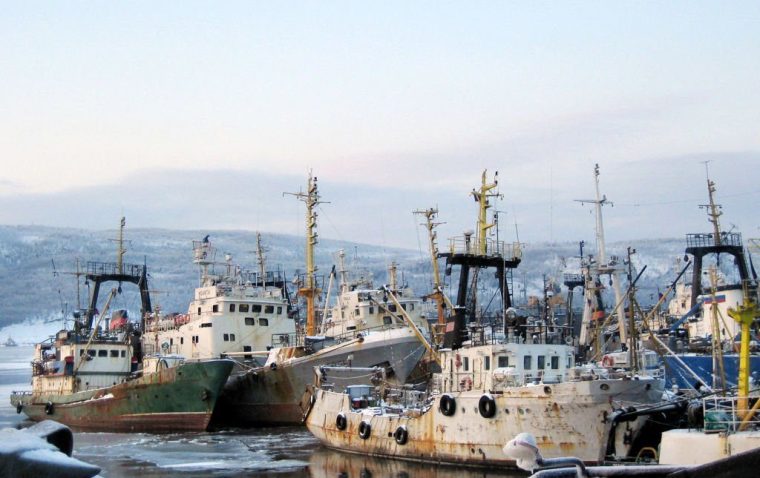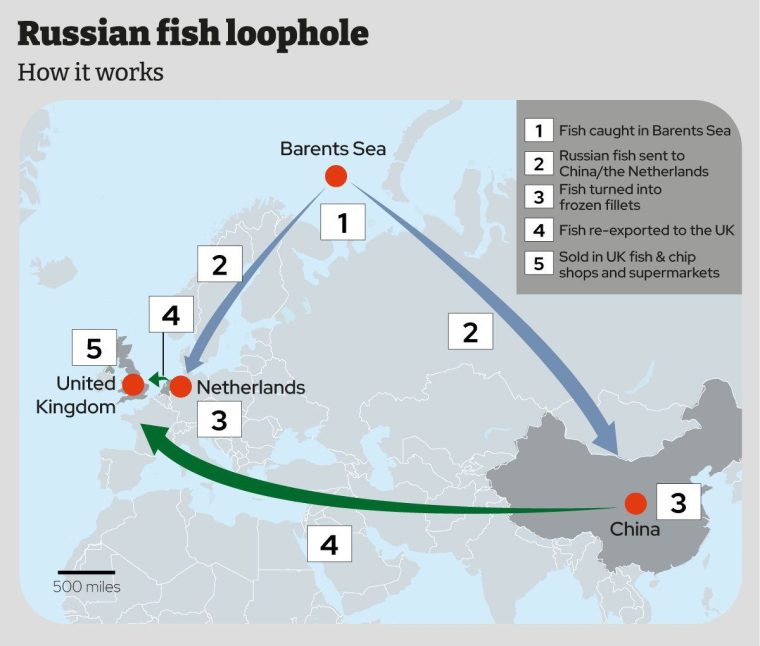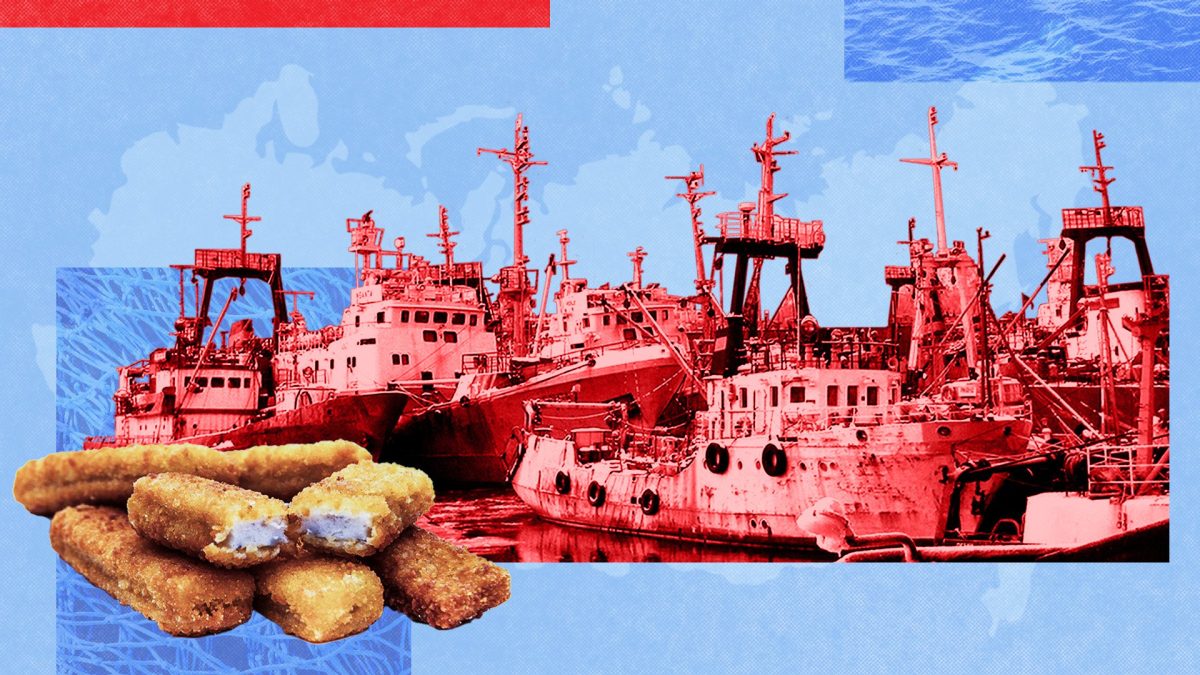Fishing giant Norebo is accused of playing a role in efforts by Moscow to spy on Nato and attack key infrastructure
A Russian fishing company suspected of supplying thousands of tonnes of fish to British retailers has been hit with sanctions after being accused of involvement in a Kremlin spying and sabotage operation in the North Sea.
Norebo, which catches some 400,000 tonnes of white fish a year, is one of two fishing companies subjected to EU sanctions this week.
The company is accused of playing a role in efforts by Moscow to spy on Nato and map or attack key infrastructure, including subsea data cables and pipelines.
The i Paper revealed in March that despite the ongoing war in Ukraine, Britain is still importing nearly 22,000 tonnes of Russian white fish per year via the Netherlands, despite warnings that Russia’s fishing industry is helping to fund Putin’s “war machine”.
Norebo – which prior to the Ukraine invasion was estimated to be responsible for catching one in five of the cod eaten in Britain – is understood to be by far the largest Russian exporter of fish landed in the Netherlands, accounting for about half of a trade worth some £1.1bn a year.
Industry sources said it is highly likely that at least some of Norebo’s fish is then re-exported to the UK and there were calls yesterday for the Government to impose its own ban on the Russian fishing conglomerate.
Brussels imposed the ban after it found vessels belonging to Norebo, which owns a fleet of about 40 trawlers, and Murman Sea Food, another major Russian producer, were directly assisting the Kremlin by loitering close to targets and “engaging in and supporting actions aimed at interfering with critical infrastructure”.
 Fishing trawlers moored in Murmansk, home to a significant proportion of the Russian fishing fleet (Photo: Dario Thuburn/AFP)
Fishing trawlers moored in Murmansk, home to a significant proportion of the Russian fishing fleet (Photo: Dario Thuburn/AFP)
This week’s EU ruling found that its trawlers were “equipped with technology that may be used for espionage” and repeatedly undertook unusual manoeuvres unconnected with fishing and which aligned with the “malign objectives” of a Russian state-sponsored surveillance campaign in the North Sea and the Baltic Sea.
Norebo told The i Paper that it categorically rejected any suggestion that it was involved in espionage, saying such claims were “false” and designed to “promote a political agenda”.
Vital cables severed
Murman SeaFood is accused of using one of its vessels, the Melkart-5, to shadow a Nato naval exercise and deploying the same trawler in seas off Norway. The EU sanctions notice said the trawler had been in the immediate vicinity of a subsea cable, used to transmit sensitive military data, when it was severed shortly before Vladimir Putin launched his invasion of Ukraine in February 2022.
Moscow has long been accused of a long-running “grey zone” campaign against the West, sponsoring or conducting acts such as attacking deep-sea pipelines and cables.
This week’s action by Brussels is understood to be the first time Russia’s vast fishing fleet – its third-biggest source of exports – has been officially named and sanctioned for aiding Kremlin sabotage operations.
An EU spokesperson called the move “notable”, adding: “[The two companies] are part of a Russia-state sponsored surveillance campaign that has conducted espionage missions and sabotage on critical infrastructure, including undersea cables.”
The sanctions ban any EU-based individual or entity from “making funds available” to the two named companies, as well as freezing their assets within the trade bloc.
But Russian businesses and state agencies have previously proved adept at circumventing similar embargoes, using third parties to obtain or sell goods that would otherwise be prohibited from legitimate trade.
Kaja Kallas, the EU’s high representative for foreign affairs, said: “Russia’s actions and those who enable Russia face severe consequences. The longer Russia persists with its illegal and brutal war, the tougher our response will be.”
In a statement, Norebo said the EU claims were “false” and it had acted at all times in accordance with the law in the countries and waters where it operates. The company said: “There is no evidence that can be delivered by the EU authorities to ever substantiate their incorrect claims. It is therefore sad to see what ought to be the rule of law and fact degrade into mere biased politics.”
Murman SeaFood did not respond to a request to comment.
Russian fish stocking UK shops
The move by Brussels poses an awkward problem for the British Government, which has yet to take any action against Norebo or other Russian fishing companies.
It was revealed last month that major retailers, including Iceland, Lidl and Birds Eye, are still using Russian fish – or have approved its supply – despite concerns the trade indirectly helps fund Putin’s war.
The buying of Russian whitefish remains perfectly legal in Britain.
In the wake of Moscow’s invasion of Ukraine, the Government placed an additional tariff of 35 per cent on Russian-origin seafood, resulting in a sharp downturn in direct imports to the UK.
The Department for Environment, Food and Rural Affairs has said it wants to see Britain’s seafood processing industry remove Russian fish from its supply chain but has thus far declined to impose a ban.
Instead, the trade has been largely diverted to locations such as the Netherlands, where Norebo has a subsidiary and has long used Dutch ports to land fish, most recently shuttling frozen fish cargoes to the EU from the centre of the Russian fishing industry in the Arctic port of Murmansk.
 Russian fish is entering the UK after first being sent to countries such as China and the Netherlands
Russian fish is entering the UK after first being sent to countries such as China and the Netherlands
A Ukrainian diplomatic source said: “We applaud the action by the EU to respond to the espionage activities of Russian fishing vessels at the same time as Moscow profits from selling fish to European countries. We would of course like other countries to follow suit.”
Karel Burger Dirven, honorary consul for Ukraine in the Netherlands, who monitors the Russian fishing industry, said he believes Norebo was using its Dutch subsidiary to sell “large quantities” of fish into the Dutch, EU and UK markets. He said: “The UK and the EU must stop doing business as usual with Russia. The UK should follow with its own sanctions and do even more.”
Norebo insisted its status was “entirely non-political”. When asked previously if it was supplying the UK market, the company said: “We are of the belief that every human being shall have access to a healthy, affordable and high-quality food product. The United Kingdom has a great tradition and long-standing culture of consuming wild seafood, and we respect its sovereign people in making their own food choices.”
Controversial ‘fish king’
Norebo is no stranger to controversy.
In 2019, the company’s billionaire owner, Vitaly Orlov – known as the “Fish King” – was embroiled in a dispute in London’s High Court with a former business partner in which it was revealed he shared a £13m flat in one of London’s prime addresses with his family’s former nanny at a time when Norebo had its European headquarters in Berkshire.
Orlov, who is estimated to be worth $2.1bn (£1.6bn) and is now based in Murmansk, has slowly built his company into a fishing behemoth, with 15 subsidiaries catching cod, haddock and pollock in the Norwegian Sea, the Barents Sea and the Far East.
But for all its commercial success, the company is regarded by Western intelligence as being closely intertwined with the Russian state and has received loans from one of the country’s largest state-owned banks, Sberbank.
According to the EU sanctions finding, both Norebo and Murman SeaFood come under the auspices of a new “martime doctrine” implemented by the Kremlin in the wake of the Ukraine offensive – a policy which “emphasises the strategic importance of civilian ships and their crews for maritime readiness, including by preparing them for wartime”.
A Government source said the UK’s sanctions regime was kept under constant review and pointed out that Russian imports to the UK have fallen by 98 per cent since February 2022.
